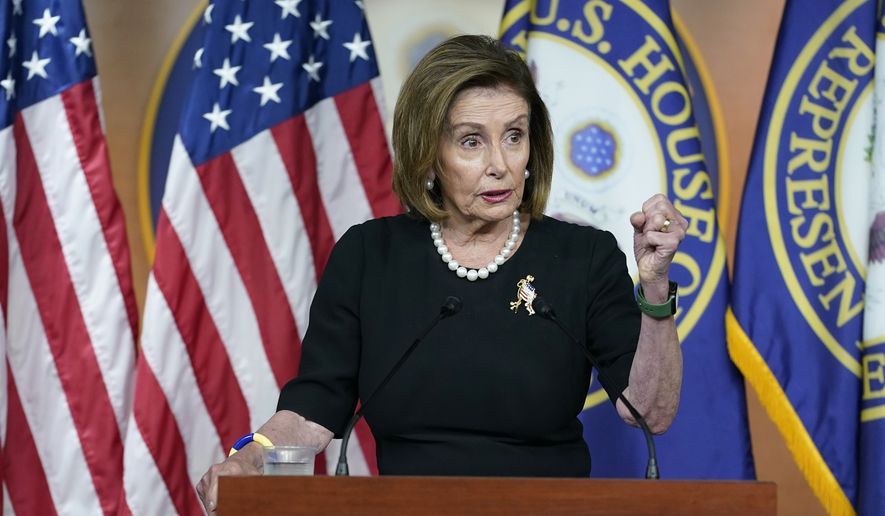China is issuing an ominous threat over House Speaker Nancy Pelosi’s reported plans to visit Taiwan.
The Chinese Foreign Ministry said Tuesday that it will take “resolute and strong measures” if the California Democrat heads to the island in August. Mrs. Pelosi, who is second in line for the presidency, was scheduled to visit Taiwan in April but had to postpone the trip after she tested positive for COVID-19.
Communist China considers Taiwan to be a breakaway province. U.S. leaders support Taiwan’s right to democratic self-rule but typically take a careful diplomatic stance, known as “strategic ambiguity,” about its formal status.
Mrs. Pelosi’s visit, as reported in the Financial Times, would be the highest-profile visit by a U.S. official since House Speaker Newt Gingrich visited in the late 1990s.
Her visit would “severely undermine China’s sovereignty and territorial integrity, gravely impact the foundation of China-U.S. relations and send a seriously wrong signal to Taiwan independence forces,” Chinese Foreign Ministry spokesperson Zhao Lijian said at his daily briefing.
“If the U.S. were to insist on going down the wrong path, China will take resolute and strong measures to safeguard its sovereignty and territorial integrity,” he said.
SEE ALSO: U.S., China clash again over territorial disputes in South China Sea
It is not clear what steps China might take, but it could send more military flights into the region or bully ships in the South China Sea.
At the Capitol, Mrs. Pelosi’s potentially defiant stance against China drew applause from Republicans unaccustomed to cheering her on.
“For once, I agree with Speaker Pelosi,” said Rep. Darrell Issa, a California Republican on the House Foreign Affairs Committee. “We should recognize the free people of Taiwan and not slight them in order to make China’s expansionist views happy. I have always believed that the people of Taiwan deserve to be able to determine their future and not have it determined by force.”
China has vowed to annex Taiwan by force if necessary and has advertised that threat by flying warplanes near Taiwanese airspace and holding military exercises based on invasion scenarios. It says those actions are aimed at deterring advocates of the island’s formal independence and foreign allies — principally the U.S. — from coming to its aid more than 70 years after the sides split amid civil war and the communists’ takeover of China.
The White House previously discouraged lawmakers from visiting Taiwan, said Rep. Claudia Tenney, a New York Republican on the Foreign Affairs Committee.
“The administration is urging us not to go,” Ms. Tenney said in an interview. “They wanted to lower the temperature. They didn’t want to be provocative to China.”
White House press secretary Karine Jean-Pierre refused to comment on Mrs. Pelosi’s travel plans, but she said the U.S. policy on supporting Taiwan has been the same as it has been for decades.
“This is nothing new here. U.S. support for Taiwan remains rock-solid principles and bipartisan and is in line with our ’One China’ policy and long-standing U.S. commitments,” Ms. Jean-Pierre said at the daily White House press briefing. “But from what I understand, there has been no announcement [from Mrs. Pelosi’s office], and I’m certainly not going to comment on her travels at this time.”
Mrs. Pelosi’s chief of staff, Drew Hammill, would not comment on the speaker’s travel plans.
“We do not confirm or deny international travel in advance due to longstanding security protocols,” he said in a statement to The Washington Times.
In recent days, China has ratcheted up its rhetoric over U.S. arms sales to Taiwan. It demanded the cancellation of a deal worth about $108 million that would boost Taiwan’s chances of survival in a military battle with its much bigger neighbor. China has the world’s largest standing military, with an increasingly sophisticated navy and a huge inventory of missiles pointed across the 100-mile-wide Taiwan Strait.
“The Chinese People’s Liberation Army … will resolutely thwart any form of interference by external forces and separatist plots of ’Taiwan independence,’” the Defense Ministry said in a statement posted on its website Tuesday.
Although Washington maintains a policy of “strategic ambiguity” over whether it would defend Taiwan in a conflict with China, U.S. law requires it to ensure the island has the means to defend itself and consider threats to its security as matters of “grave concern.”
Washington maintains unofficial relations with Taiwan in deference to Beijing, but it is the island’s strongest political ally and source of defensive arms.
Mr. Zhao gave no details about actions China might take in response to Mrs. Pelosi’s visit, but Beijing has generally used military flights and war games to indicate its discontent. Chinese pilots have been accused of aggressive action toward surveillance aircraft from the U.S. and its allies operating in international airspace off the Chinese coast while using lasers and other methods to harass foreign warships in the South China Sea.
China’s most serious threat against Taiwan was in 1995 and 1996 when it held military exercises and lobbed missiles into waters north and south of the island in response to a visit to the U.S. by Taiwanese President Lee Teng-hui.
Correction: A previous version of this article misstated Rep. Claudia Tenney’s party affiliation. Ms. Tenney is a Republican.
• This article is based in part on wire service reports.
• Tom Howell Jr. can be reached at thowell@washingtontimes.com.
• Kerry Picket can be reached at kpicket@washingtontimes.com.




Please read our comment policy before commenting.